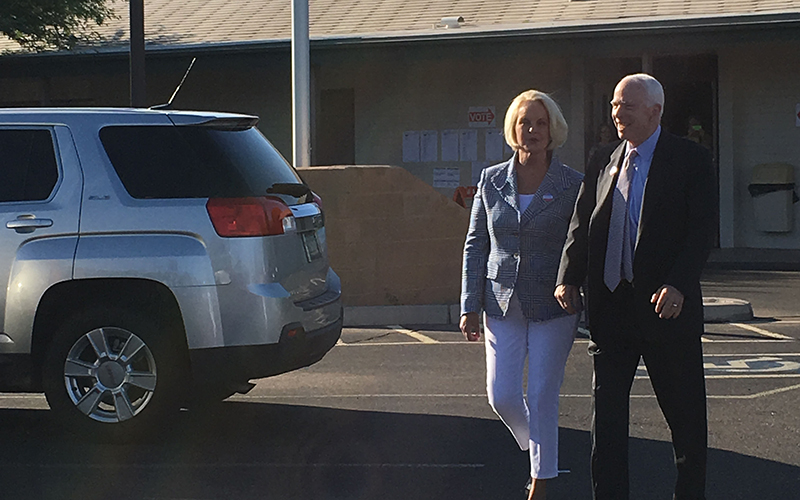
Republican Sen. John McCain and his wife, Cindy, walk out to greet supporters after voting in the Arizona primary election. The veteran lawmaker faces Kelli Ward and three other opponents in the primary. (Photo by Mindy Riesenberg/Cronkite News)
PHOENIX – Arizona Republicans want John McCain to serve a sixth term as their U.S. senator, handing him a comfortable victory in the Tuesday primary. With 20 percent of the vote reported, McCain held a 53.7 to 36.8 percent lead over challenger Kelli Ward.
McCain, who turned 80 on Monday, will face Democrat Ann Kirkpatrick as he wrestles with his public but tangled endorsement of Republican presidential nominee Donald Trump.
“Your support is a privilege – I promise to work as hard as I can to deserve (it),” McCain said to supporters at his local campaign headquarters. He ended his speech with “now, let’s go win one more time.”
With more than 50 years of political experience between them, McCain and Maricopa County Sheriff Joe Arpaio defeated challengers, moving on to stiffer competition in the November general election. Democrat Paul Penzone is seeking to unseat Arpaio from an office he’s held since 1993.
Voting seemed to go smoothly with more than 700 polling places open in Maricopa County, according to the county’s elections website. That’s in contrast to March’s presidential preference election, when an effort to save money reduced the number of polling places and forced people in Maricopa County to wait in line for hours before being able to cast a vote. There were virtually no lines witnessed at polling places in the Valley.
Trump, who is scheduled to give a speech on immigration on Wednesday in Phoenix, once made light of McCain’s experience as a prisoner of war and McCain stayed away from the Republican National Convention that named Trump as the Republican nominee. McCain has said he “supports the party’s nominee,” and Trump offered a mild endorsement of McCain.
Ward, the veteran senator’s main Republican competitor, built her campaign on equating McCain with the “Washington Establishment.” At least on Twitter, McCain appeared unflappable, sharing news articles and posting a note of thanks to those who sent him birthday wishes.
With 54 percent of the precincts reporting, former Buckeye police chief Dan Saban gained only 25.9 percent of Republican votes to Arpaio’s 66.4 percent, even as a potential criminal contempt of court case shadows Arpaio’s run for a seventh term. Arpaio and three others await a decision from the U.S. Attorney’s Office on whether they will be prosecuted for allegedly flouting court orders in a lawsuit accusing him of racial profiling. A U.S. District Court judge referred the case to the Attorney’s Office just 10 days before the election.
“I want to thank the people that had confidence in me tonight, with all the certain media going after me,” Arpaio said in an interview at the Arizona Republican Party headquarters Tuesday night. “Everybody seems like they’re going after the sheriff.”
Responding to the possibility of facing criminal contempt charges, he said, “That’s the way it is. We’ll be addressing that matter very soon and hope that the real story comes out.”
Saban was not available for comment Tuesday night.
A slew of other state representative and senatorial races were decided as well, although 70 percent of incumbents seeking re-election in Arizona legislature ran unopposed, a significant increase from the last three primaries, according to an analysis by Ballotpedia.
Nominations for the Arizona Corporation Commission were too close to call in a race that drew attention, and donations, from groups with vested interests in solar power, according to Arizona Capitol Times.
“Obviously, we are spending on candidates, but we are doing it openly,” said Save Our AZ Solar chairwoman Kris Mays in an interview with CBS 5. “We’re doing it honestly.” Republicans have held all three seats in the Corporation Commission since 2009.
Maricopa County Recorder Helen Purcell held a small lead, despite widespread criticism for her handling of the presidential preference election in March. Only 60 polling places were open then, leading to long lines and angry voters. She apologized and promised to ratchet up polling places for other elections.